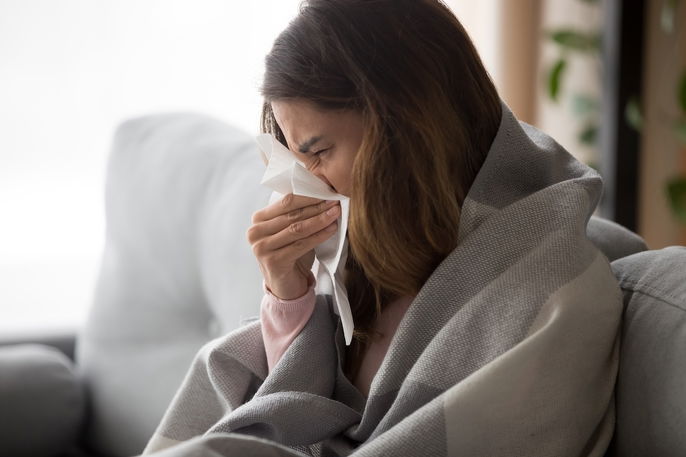COVID-19 symptoms will initially present as a headache, muscle aches, fatigue, cough, runny nose or a runny nose. They can appear up to 14 days after the first contact with the virus.
Nonetheless, COVID-19 symptoms can vary from person to person. They may be milder and flu-like, or more severe. Severe symptoms of COVID-19 include chest pain and shortness of breath, which are more common in older adults and those with chronic diseases, such as diabetes, autoimmune diseases or cancer.
If you notice any COVID-19 symptoms, you should get tested with a COVID-19 rapid test or PCR swab, and remain in isolation to prevent transmitting the disease to other people.

Main symptoms
The most common symptoms of COVID-19 are:
- Dry and persistent cough
- Fever above 38ºC (or (100.4ºF)
- Excessive fatigue
- Generalized muscle aches
- Headache
- Sore throat
- Runny nose or stuffy nose
- Changes in bowel movements, especially diarrhea
- Loss of smell, known as anosmia, and loss of taste, called dysgeusia
In addition, due to airway irritation caused by the infection, some patients may also report an itchy or scratchy throat.
In some cases, it is also possible to notice symptoms in the fingers, popularly known as "COVID fingers". Although some people may not experience any discomfort, others may report intense pain, itching, swelling, blisters, and skin that is rough, raised and red or purple.
Symptoms by variants
COVID-19 symptoms can vary slightly depending on the variant of the infection, which can cause less or more intense symptoms. In general, COVID-19 causes fever, cough, muscle aches, and a sore throat, however specific variants can also cause:
- Alpha: loss or changes in smell or taste, loss of appetite and chills;
- Beta: excessive fatigue, vomiting and diarrhea;
- Gamma: excessive fatigue, vomiting and diarrhea;
- Delta: headache, runny nose, constant sneezing;
- Omicron: headache, runny nose, nasal congestion and excessive fatigue.
It is important to note that a person may present none, one or more symptoms of infection, and a person infected with the delta variant, for example, may also present changes in taste.
When do initial symptoms appear?
The initial symptoms of COVID-19 can take between 2 and 14 days to appear. The first symptoms are usually excessive fatigue, headache and body aches.
Because the symptoms of COVID-19 can be similar to those of a common flu, it is important to get tested to confirm or rule out the infection causing the symptoms.
Also recommended: Cold vs Flu: Main Differences, How to Treat & Home Remedies tuasaude.com/en/cold-vs-fluOnline symptom checker
If you think you may have COVID-19, report your symptoms below:
{TEST_SYMPTOMS_CORONAVIRUS}
This symptoms quiz is only a guidance tool and does not replace an assessment or diagnosis with a doctor.
Difference between COVID-19 and dengue
Both COVID-19 and dengue can cause some similar symptoms, such as fever, muscle aches or headaches. However, with dengue, symptoms are usually more intense.
In addition, COVID-19 commonly presents with difficulty breathing, dry cough, and a runny or blocked nose, while dengue does not.
Other symptoms of dengue that do not present with COVID-19 include red spots on the body, pain behind the eyes and joint pain. Read more about dengue symptoms and how they can present with classic and hemorrhagic dengue.
Confirming a diagnosis
A COVID-19 diagnosis is usually confirmed by a general practitioner or infectious disease specialist. The assessment usually starts with an evaluation of the patient's symptoms and contact history.
They doctor may then order a COVID-19 test, which may involve collecting respiratory secretions with a swab, or ordering bloodwork to check for COVID-19 antibodies.
Severe symptoms of COVID-19
In very severe cases of COVID-19, symptoms tend to worsen over a short period of time. With severe cases, the patient develops difficulty breathing, chest pain and confusion. In these cases, the infection should be treated in a hospital setting.
These more severe symptoms are more likely to appear in adults over the age of 60 and in patients with a compromised immune system due to an autoimmune disease, chronic disease or previous organ transplant.
How it is transmitted
COVID-19 is mainly transmitted through the inhalation of droplets that are suspended in the air after an infected person coughs or sneezes. However, it is also possible to catch COVID-19 if you touch an infected surface and then touch your eyes, nose or mouth.
The risk for transmitting is higher in the two days before symptoms appear and in the 3 days after the onset of symptoms.
Treatment options
There is no specific treatment for COVID-19. Instead, measures such as hydration, rest and a light and balanced diet are often advised to support the immune system for a speedy recovery.
The doctor may prescribe analgesics like acetaminophen to treat discomfort and fever. These should be taken as recommended by your doctor.
In more severe cases, where the person has difficulty breathing, for example, it is important to go to the hospital for more targeted treatment and monitoring. In these cases, oxygen therapy and IV medications may be required.






























